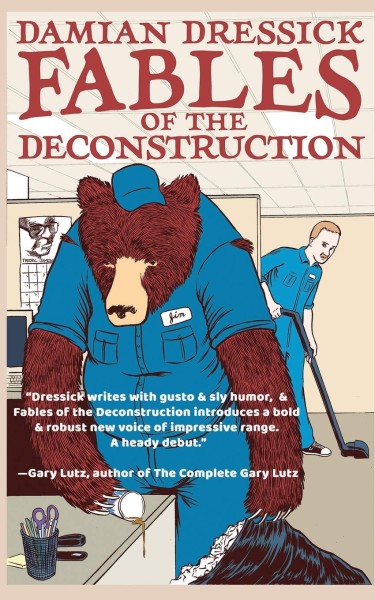
Reviewed by Beret Olsen
With his new collection, Fables of the Deconstruction, Damian Dressick launches sixty-four whizzing literary salvos, crackling with wit and surprise. There are many brilliant moments: some surreal, some sharply satiric, some devastating. Stories drift easily from humor to tragedy, shapeshifting from prose into pie charts and dictionary entries, lists and a GoFundMe campaign, and Dressick uses each form well.
Part of the fun is the way the author plays with rules and expectations. He invites readers to choose sides, to choose their own adventures, and to pause mid-story and predict—an impossible task. You know what’s tough about working with Jim? I assure you, you do not. It’s not that Jim’s late, or that he’s a crap janitor. It’s not even his meth problem.
In “We Must Leave this Arid Land Where the Relentless Sun Beats Down,” a woman floats down Laurel Canyon Boulevard on her way to buy socks. Left unchaperoned at home, her two Labrador retrievers drag a couple of Eames chairs onto the patio for a cup of tea.
“‘Woof,’ says Luciano, the wiser and more resigned of the two.
‘You can say that again,’ says the other.”
Dressick takes pleasure in the English language as well. His puns and word play in “Accrual” make for vivid, joyful reading. In “Bruce Redman Says ‘No, But Maybe,’” Bruce says a lot more than no. He lets loose a litany of bombastic verbiage to great effect—sobriquet, ersatz, penury, limn, suppurating—all liberally embellished with words and phrases that no one with a shred of professional decorum would dream of using in a workplace communiqué. It’s delightful, and wouldn’t pack nearly the punch without his linguistic gilding.
Very occasionally, the author’s rich vocabulary and deep references get in the way of his storytelling rather than adding flavor or nuance. Words like oblation, benison, and laved feel like secret code for the literati, while his unadorned language cuts deeper. “Cleanliness” is visceral in its strange simplicity. “I come home to the smell of meat,” it begins. What follows is unexpected, difficult, and poetic. The third story in the collection, “Four Hard Facts about Water,” is flawless, pitch perfect, jaw-dropping. It stands as testament to why flash fiction is such a potent literary form. Compressed into the words and white space of a single page are a childhood, an adulthood, and a lifetime of guilt.
Had I read the stories in isolation, I might not have noticed, but bound together, a troubling pattern emerges. Though nearly all of Dressick’s characters are deeply flawed, somehow the men emerge as whole beings, while the women seem flatter, more predictable, reinforcements of cliché. Women masturbate, weep, suffer abuse, and screw their way to financial security. They are strippers, heroin addicts, and spurned housewives; they are naked and upside-down. They are spineless or heartless, “with tits like cantaloupes.” As I made my way through the collection, I became increasingly nervous to meet the women I found there.
In contrast, even the most difficult male characters are portrayed with a modicum of empathy. “Ab Initio,” for example, carefully traces the roots of a young man’s racist and violent behavior. Elsewhere, readers are invited to understand and empathize even as one character hits his wife in McDonald’s, and another turns himself in for sexually abusing his daughter. To be clear, Dressick certainly isn’t condoning such behavior, and I’m not condemning him for writing about men this way. But if women are going to appear inhabit the stories, let them be fully human as well.
At his best, Dressick is fresh and hilarious, brutal and insightful, and these are snappy, masterful stories. Who else could define the high school experience without a single reference to high school, or teens, or anything at all related? Or reanimate Jesus in a coal mine, retelling an oft-told story with a new, sharp edge? Despite my misgivings, I’ll be reading and rereading many of these stories for many years to come. I invite you to do the same. Find out what’s hard about water, what else Bruce Redman has to say, and why Jim is such a pain in the ass.
__________________________
 Beret Olsen is a writer, a photographer, and the photo editor for 100 Word Story. Her art, essays, and fiction have appeared in publications including First Class Lit; Flash: The International Short-Short Story Magazine; the Masters Review; and her blog, Bad Parenting 101.
Beret Olsen is a writer, a photographer, and the photo editor for 100 Word Story. Her art, essays, and fiction have appeared in publications including First Class Lit; Flash: The International Short-Short Story Magazine; the Masters Review; and her blog, Bad Parenting 101.

 The core workshop of SmokeLong Fitness is all in writing, so you can take part from anywhere at anytime. We are excited about creating a supportive, consistent and structured environment for flash writers to work on their craft in a community. We are thrilled and proud to say that our workshop participants have won, placed, or been listed in every major flash competition. Community works.
The core workshop of SmokeLong Fitness is all in writing, so you can take part from anywhere at anytime. We are excited about creating a supportive, consistent and structured environment for flash writers to work on their craft in a community. We are thrilled and proud to say that our workshop participants have won, placed, or been listed in every major flash competition. Community works.